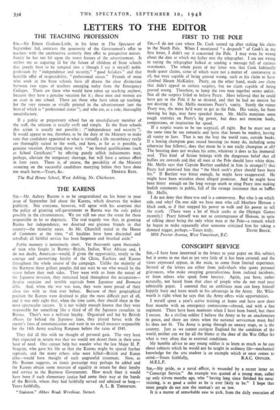FIRST TO THE POLE
SIR,—I do not care where Dr. Cook turned up after staking his claim to the North Pole. When I mentioned " a despatch " of Cook's in my first letter, I didn't say it concerned the Pole. I may even be wrong about the date at which my father met the telegrapher. I am not wrong in saying the telegrapher balked at sending a message full of curious statements. The whole point of my letter was that Cook habitually made queer claims, some of which were not a matter of controversy at all, but were capable of being proved wrong, such as his claim to have
climbed Mount McKinley. Peary, on the other hand, made one claim
that didn't appeal to certain sceptics, but no claim capable of being proved wrong. Therefore, to lump the two men together seems unfair.
Not all the sceptics failed to believe Peary. Most believed that he could have got to the Pole if he so desired, and that he had no motive for not desiring it. Mr. Mellis mentions Peary's vanity. Surely the vainer Peary was, the more he'd want to get to the Pole. His vanity, far from slowing his legs, may have speeded them. Mr. Mellis mentions some rough statistics on Peary's leg power, but does not mention loads, companions, or inspiration for speed.
If a sceptic wants to be too sceptical, all right. But he must not at the same time be too romantic and insist that heroes be modest, leaving all vanity to liars. That is not the 'way the world runs, outside books.
If a boxing champion goes round boasting (as many do, including some otherwise fine fellows), does that mean he is not really champion at all?
The boasting does not wecken his arms, whatever it does to his immortal soul. This kind of fiction belongs with the dangerous belief that all bullies are cowards and that all men at the Pole should have white skins.
Mr. Mellis says that Captain Bartlett confided in him (a stranger?) that Peary had promised him that " the black cook's place should have been his." If Bartlett was bitter enough, he might have exaggerated. He might have been mistaken about alleged promises. And he might have been bitter enough on the long voyage south to sting Peary into making foolish statements in public, full of the strange insistence that so baffles Mr. Mellis.
I do not deny that there was and is a controversy. But who is on which side, and why? On one side we have men who call Matthew Henson a black cook, as if that stopped his power to walk and his power to tell the truth: (There were a lot of black cooks at the Olympic Games recently.) Peary himself was not so contemptuous of Henson, in spite of talking about being the only white man at the Pole—a remark which he began to make repeatedly after someone criticized him for taking a


































 Previous page
Previous page